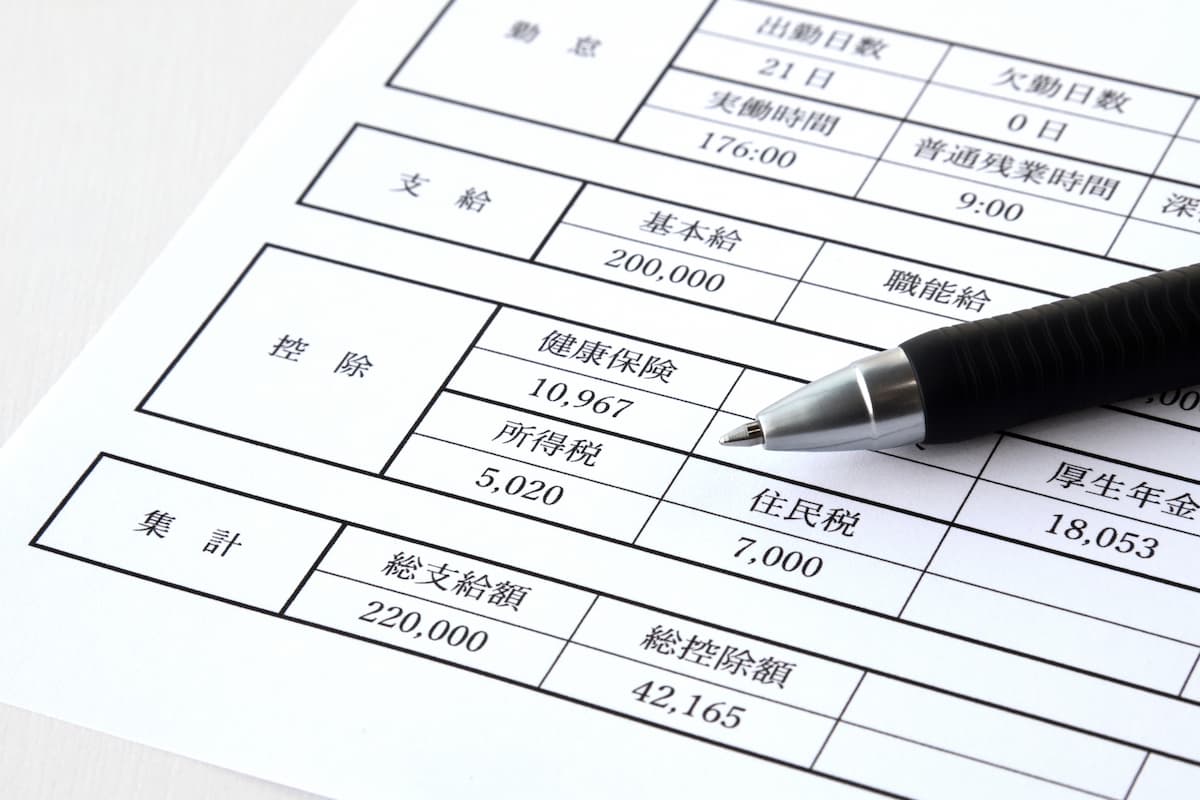An easy-to-understand guide to reading your pay slip! Things to be careful about and how to handle it

Hello, this is Kano from JAC (Japan Association for Construction Human Resources).
A pay slip is what you receive from your company on the day your salary is paid.
A pay slip is a document that lists the amount of your salary (basic salary) and any other wages (salary allowances) that you receive in addition to your basic salary.
Have you ever checked your pay slip carefully?
There are some things to look at carefully when looking at your pay slip.
So it’s important to know how to look at it.
This time, we will explain how to read your pay slip in an easy-to-understand manner.
You will also need to keep your pay slips, and we will explain why.
*"Salary" refers to the total amount of salary (basic salary) paid by the company and wages (salary allowances) received in addition to basic salary.
An easy-to-understand guide to reading your pay slip!
A pay slip is a document detailing your attendance, payments, and deductions.
It is a legal requirement for companies to provide pay slips to employees.
When checking the contents of your pay slip, it is also important to know the closing date and payment date.
- Closing date: The last day of the period for which payroll is calculated
- Payment date: The date your salary is paid
The closing date and payment date vary depending on the company.
Three things to look for on your pay slip
We will explain how to read the three important things written on your pay slip.
- Number of days and hours worked (attendance)
- Amount paid by the company (payment)
- Amount deducted from salary (deduction)
The way pay slips are written varies from company to company.
If you don't have any of the following, ask your payroll rep.
1. Number of days and hours worked (time attendance)
The "Attendance" section records the number of days worked and the hours worked.
Generally, the following items are recorded in the attendance sheet:
- Number of working days: The number of days you work as determined by the company
- Days worked: Number of days worked
- Days absent: Number of days absent from work
- Number of special leave days: Number of days of special leave taken for ceremonial occasions (weddings and funerals)
- Number of paid vacation days: Number of paid vacation days used
- Remaining paid vacation days: Number of remaining paid vacation days
- Working hours: Total working hours
- Overtime hours: Hours worked beyond the statutory or regular working hours.
- Late-night hours: Hours worked between 10:00 p.m. and 5:00 a.m.
- Holiday working hours: Hours worked on holidays as stipulated by law (Labor Standards Act)
- Lateness/early departure time: Time that you were unable to work due to being late or leaving early
*Legal working hours are the upper limit of working hours set by law (Labor Standards Act). Scheduled working hours are the upper limit of working hours set by the company.
★Points to consider
In particular, check that there are no errors in the number of days worked, working hours, or number of days absent.
2. Amount paid by the company (payment)
The "Payment" section lists the basic salary (basic salary) paid by the company and any wages (salary allowances) you receive in addition to the basic salary.
The two things that are always written in the payment section are:
- Base salary: Basic salary paid monthly
- Overtime pay: Wages paid for work done outside of basic working hours
Below are some examples of other wages (salaries and allowances) you may receive.
*However, not all companies offer this benefit, and the conditions for receiving it vary depending on the company.
- Commuting allowance: Commuting expenses
- Position allowance: Wages paid for a position
- Qualification allowance: Wages paid if you have or have acquired a qualification
- Housing allowance: Wages that subsidize the rent of a home
- Family allowance: Wages paid to those who have dependents such as a spouse (wife or husband) and children
- Regional allowance: Wages paid to those working in areas with high prices, inconvenient living conditions, or cold regions
- Travel allowance: Wages paid when traveling
- Perfect Attendance Allowance: Wages paid if you do not miss work
In the construction industry, companies may offer the following allowances:
- On-site allowance: wages paid for work done on-site
- Underground allowance: Wages paid for work done in tunnels, etc.
- Driver's allowance: Wages paid for driving a vehicle necessary to carry out work.
- Tool allowance: Wages paid for tools purchased by the worker
★Points to consider
Check whether you are receiving allowances for the work you are doing during the period for which your salary is paid.
3. Amounts deducted from salary (deductions)
"Deductions" lists the amount of insurance and taxes that will be deducted from your salary.
The main insurance and tax costs are as follows:
[Insurance premium]
- Health insurance: Insurance to cover medical expenses incurred in treating illness or injury
- Nursing care insurance: Insurance to receive nursing care services due to old age or injury (for foreigners aged 40 or older who stay in Japan for 3 months or more)
- Employee's Pension Insurance: Public pension insurance for company employees and civil servants
- Employment insurance: Insurance to prepare for unemployment and childcare leave
*The insurance you enroll in will vary depending on the working conditions, so please check with your company.
【tax】
- Income tax: Tax levied on income earned between January 1st and December 31st of the year.
- Resident tax: Tax paid to the city, town, village or prefecture where you are registered as a resident
★Points to consider
Monthly income tax is deducted from your salary on a rough basis, with the exact calculation done at the end of the year.
This calculation is called "year-end adjustment."
Therefore, if there is a shortage, it will be deducted and any excess tax paid will be refunded.
If a deduction is made, the deduction amount will have a "- (minus)" sign.
If you receive a tax refund, it will be written as "year-end adjustment refund amount" or "income tax refund amount."
This is usually written on your December pay slip, but it may be January or February, so be sure to ask your payroll officer.
Things to note when looking at your pay slip

When you receive your pay slip, be sure to check it.
The main things you should check are:
- Are the working days and hours correct?
- Is the overtime time correct?
- Are the number of working days, overtime hours, and allowances consistent with the employment conditions?
In particular, you should know how to calculate overtime pay.
How to calculate overtime pay
Overtime pay is the wage paid for work done in excess of 8 hours a day and 40 hours a week (overtime work).
However, if the employment contract states that "basic salary includes ◯ hours of overtime per month," you will be paid an amount exceeding this overtime amount.
[How to calculate overtime pay]
■Overtime pay = 1 hour's wage x premium rate x overtime hours
*1 hour's wage = (monthly basic salary - allowance*1) ÷ average scheduled working hours per month (*2)
*1: Wages unrelated to work (family allowances, housing allowances, etc.)
*2: Average scheduled working hours per month = number of days worked per year × scheduled working hours ÷ 12
The premium rate varies depending on the type of overtime hours worked.
| Types of overtime | Surcharge rate |
|---|---|
| Overtime | 1.25 |
| Holiday work | 1.35 |
| Late-night (22:00 to 5:00) work | 1.25 |
| Overtime work + late night work | 1.5 |
| Holiday work + late night work | 1.6 |
Source: Ministry of Health, Labor and Welfare "Wage table that serves as the basis for overtime pay"
If you're not sure how to calculate this, ask your payroll department.
How to handle your pay slip
A pay slip is required in the following situations:
- When filing tax returns
- When claiming unpaid wages
- When checking the period of employment insurance enrollment
Filing a tax return is the process of calculating and reporting your income tax yourself.
If you have overpaid tax, you can get the overpaid tax back by filing a tax return.
Basically, if you're an office worker, you don't have to do it yourself.
You are required to file a tax return if the following conditions apply:
- If you have another job that you earn income from
*Some companies prohibit side jobs, so be sure to check with your company. - International students or Designated Activities people who have worked multiple part-time jobs migrate to Specified Skills
Also, if you have unpaid wages or overtime pay, you can request a pay slip as evidence.
You can make a claim within two years of the date your pay slip was issued.
It can also be used to check the period of time you have been covered by employment insurance.
Keep it for at least two years.
Summary: Check your pay slip for attendance, payments, and deductions! Pay attention to overtime calculations and storage periods
A pay slip is issued by a company whenever it pays its employees.
The pay slip contains detailed information about attendance, payments, and deductions.
In the attendance section, you can check the number of days worked, overtime hours, etc.
Under Payment, you can check your basic salary and any other wages you may receive.
Deductions lets you see how much is taken out of your paycheck.
Your pay slip will also be used to confirm employment insurance, file tax returns, and file claims for unpaid wages, so you should keep it for at least two years.
*This article was written based on information from November 2023.
About us, JAC
JAC(Japan Association for Construction Human Resources)is an organization that supports all Specified Skilled Workers working in the Japan construction industry. We work with companies that accept Specified Skilled Workers to create a work environment that is easy for everyone to work in.
We're also taking the exams you need to become a Specified Skilled Workers!
And JAC has received many requests for job offers from companies that want Specified Skilled Workers to work for.
Specified Skilled Workers Wanted! Job Listings
For those of you who want to work in Japan using Specified Skills, we are introducing jobs that match your occupation and aspirations!
If you have any problems, please feel free to contact us!








